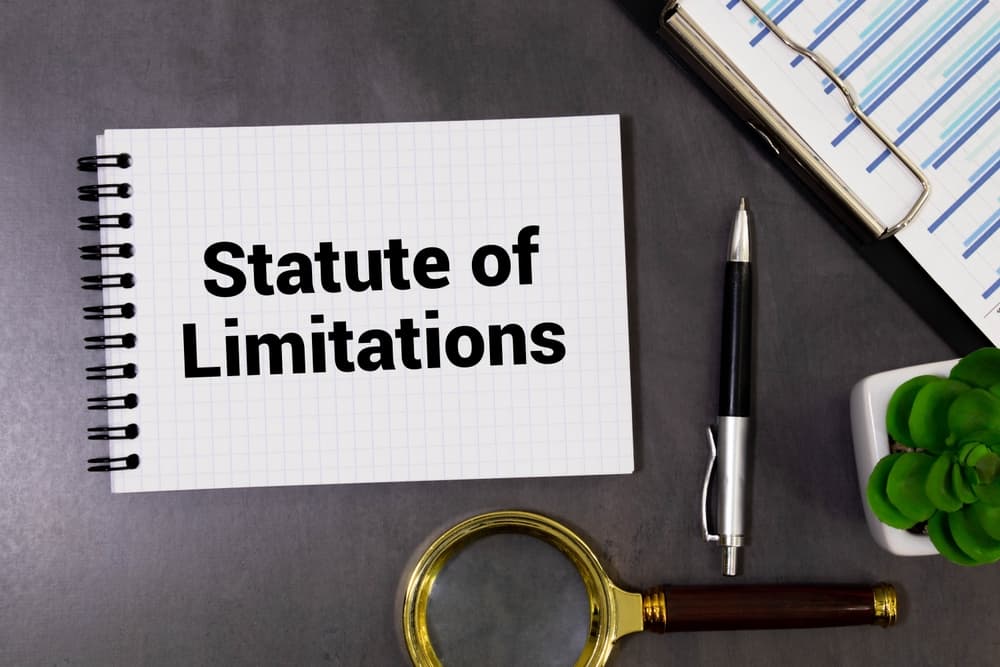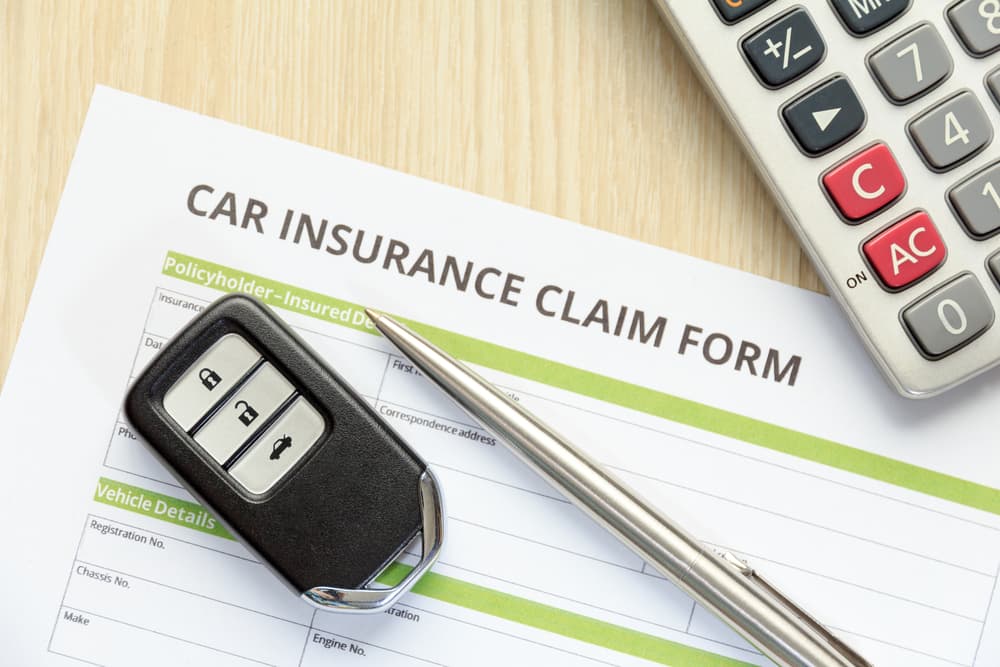What Is the Statute of Limitations in a Car Accident Claim?
What Is the Statute of Limitations in a Car Accident Claim?
Involvement in a car accident introduces numerous challenges, from medical expenses to emotional distress. Amid these difficulties, you must understand the statute of limitations (SOL) in a car accident claim—a legal parameter dictating the time an individual has to file a lawsuit after being part of a car accident. Reach out a seasoned car accident lawyer for legal assistance in your case.
Schedule a Free Initial Consultation
What Is a Statute of Limitations?

The statute of limitations establishes the time frame for initiating a civil lawsuit, particularly in personal injury cases like car accidents. This clock begins ticking from the moment of injury, with the time limit varying by location. Though exceptions exist, most states set the SOL between one and six years.
Understanding this legal concept is crucial for car accident victims, as it dictates the window to take legal action against potentially liable parties. Seeking prompt advice from an experienced car accident attorney is recommended, given the unique circumstances and specific rules associated with each case.
Familiarizing yourself with the SOL ensures you know the deadline to file a claim and take the necessary legal steps against responsible parties. Failure to adhere to these limits may result in forfeiting your right to seek compensation for injuries or damages from the accident.
General Exceptions to the Car Accident Statute of Limitations
Within the statute of limitations for car accidents, exceptions and nuances exist, with variations depending on the state and circumstances surrounding the accident. Typical exceptions in each state include:
The Discovery Rule
The discovery rule typically applies in cases where injuries may not immediately manifest post-accident. The timeline may start when you discover (or should reasonably have discovered) the injury.
For instance, if you suffered a head injury in a car accident but didn’t find out about it until three weeks later, the clock wouldn’t start ticking until you found out.
Minors
For minor children (under 18), the statute of limitations is usually paused or tolled until they reach 18. Afterward, they follow the standard state law deadline for filing a lawsuit. For example, if a child experienced a car accident at age 11 in a state with a two-year statute of limitations, the clock wouldn’t start until their 18th birthday, expiring on their 20th birthday.
Government Entities
Seeking compensation from a government entity involves different rules and shorter timelines. Notice of your claim may be required within a much briefer period, often as little as six months. Then, you may only have as little as another six months to file your claim.
Wrongful Death
In cases where a car accident leads to a wrongful death action, the statute of limitations typically commences on the date of the individual’s passing, not the accident date (unless they coincide). However, this timeframe can vary based on various circumstances, necessitating legal counsel for precise deadlines.
Regardless of injury specifics or accident details, securing the representation of an experienced car accident attorney is crucial to pursuing the compensation you deserve. Your attorney can provide insights into your state’s SOL laws and determine if exceptions or tolling apply to your case.
The Purpose and Functions of the Statute of Limitations
The personal injury statute of limitations serves several purposes within the legal system, including the following:
Preserving Evidence
This legal timeframe ensures the timely filing of lawsuits, preserving evidence while it is fresh and reliable. This prevents deterioration, loss, or alteration over time, maintaining the integrity of evidence for a fair legal process.
Protecting Defendants
The statute of limitations shields at-fault parties from facing lawsuits for events that occurred long ago.
Judicial Efficiency
By establishing a clear timeframe for filing lawsuits, the statute of limitations promotes efficient case management. It prevents cases from coming forward long after the events in question, contributing to a more streamlined legal process.
Closure and Finality
Statutes of limitations provide a sense of closure for both plaintiffs (injured parties) and defendants (at-fault parties). Once the specified period has passed, individuals can move on without the constant threat of potential legal action looming over them.
Encouraging Timely Resolution
Setting a time limit motivates prompt legal action, leading to quicker dispute resolution. The result is a more efficient legal process, reducing delays in reaching judicial resolutions.
Preserving Legal Rights
The statute of limitations ensures that individuals don’t delay seeking redress indefinitely. It safeguards the legal rights of all parties involved by imposing a reasonable timeframe for claims.
Balancing Interests
This legal framework strikes a delicate balance between plaintiffs seeking compensation and defendants’ rights to defend themselves. It prevents undue delays in filing claims while allowing defendants to reasonably anticipate and prepare for potential legal actions.
Consequences of Missing the Statute of Limitations for Your Car Accident Claim
Failing to adhere to the personal injury statute of limitations in the aftermath of a motor vehicle accident can have severe consequences, potentially jeopardizing your ability to pursue rightful compensation.
Understanding the nuances of these limitations is crucial for protecting your legal rights. While exceptions exist in rare cases, such as incidents involving minors or delayed injury discovery, relying on these exceptions can be risky without the guidance of an experienced car accident attorney.
The ramifications of exceeding the statute of limitations include:
- Barred Lawsuit: Exceeding the deadline results in forfeiting the right to file a personal injury lawsuit related to the car accident. You can still technically file your claim. However, the court will likely dismiss your case, providing the at-fault party with a valid defense.
- Inability to Seek Compensation: Without a lawsuit, avenues for pursuing compensation, including medical bills, lost wages, and pain and suffering, become severely limited. This leaves you grappling with the financial aftermath of the accident on your own.
- Loss of Crucial Evidence: Over time, evidence may degrade, vanish, or become less reliable. Failing to initiate a lawsuit within the statute of limitations hinders your ability to collect and present crucial evidence supporting your claim, impacting your chances of receiving fair compensation.
- Waiver of Legal Rights: Missing the deadline effectively waives your entitlement to legal action for your injuries. Even if your case is strong, it becomes inadmissible if the timeframe lapses.
- Defendant’s Strategic Advantage: Defendants and their insurers, well-versed in the statute of limitations, may strategically exploit this deadline during negotiations. They may intentionally drag out your case to let the statute of limitations expire so that you no longer have legal rights.
- Emotional Toll: Missing the statute of limitations can be emotionally distressing, signaling a missed opportunity to hold the responsible party accountable for their actions.
To prevent missing the statute of limitations, take prompt action after a car accident.
Seek a car accident attorney promptly after the incident. An experienced attorney can explain the applicable statute of limitations, gather evidence, assess the strength of your case, and navigate the complexities of the personal injury legal process.
Will My Car Accident Claim Go to Trial?

The likelihood of your car accident case going to trial depends on several factors. In most instances, car accident cases resolve through settlements, a negotiated agreement between involved parties that often proves quicker and less costly than proceeding to court.
However, if your attorney cannot reach a favorable settlement agreement with the at-fault party’s insurance company, or if disputes over liability and compensation are substantial, the case may advance to trial.
The decision to go to trial depends on factors, such as:
- The severity of injuries
- Your case’s complexity
- Insurance coverage
- The willingness of the parties to engage in negotiations
Ultimately, your car accident attorney will diligently work to secure the best possible outcome for your case. This may involve negotiation or, if necessary, taking the case to trial. Your attorney will offer guidance on the most appropriate course of action based on the specific details of your case, ensuring your interests are priorities throughout the legal process.
If your case necessitates going to trial, your car accident attorney will be ready to represent you in court so that you can receive the compensation you deserve.
Car Accident Damages: Understanding Economic and Non-Economic Losses
Damages resulting from a car accident include the losses incurred due to the negligence or wrongdoing of the at-fault party. Compensation for these damages is vital for the victim and can vary in type and value. The two primary categories of damages are economic and non-economic.
Economic Damages (Special Damages)
Economic damages, often termed special damages, represent the tangible and measurable costs of the injury.
These include:
- Lost Income: Compensation for income lost due to the inability to work.
- Loss of Future Earning Capacity: Reimbursement for diminished earning potential resulting from the injury
- Property Damage: Cost coverage for damage to your vehicle or other property.
- Medical Expenses: Coverage for a range of medical costs, including but not limited to:
- Ambulance services
- Hospital and emergency room fees
- Medical testing (lab work, X-rays, CT scans, MRIs)
- Physician and radiologist bills
- Prescription medications
- Chiropractic care
- Physical therapy or rehabilitation
- Medical equipment (e.g., crutches or a wheelchair)
Economic damages are objective and calculable, facilitating straightforward assessments.
Non-Economic Damages (General Damages)
Non-economic or general damages are subjective and lack inherent monetary value, making fair compensation challenging.
These include:
- Pain and Suffering: Compensation for physical and emotional distress endured or anticipated.
- Loss of Enjoyment of Life: Reimbursement for the loss of present and future enjoyment in daily activities, hobbies, recreational pursuits, and social interactions.
- Loss of Consortium: Compensation for losing the ability to give or receive affection and the benefits of a family, typically within a marriage relationship.
While not easily quantifiable, these damages are integral to a comprehensive claim. A seasoned car accident lawyer is skilled at negotiating with the at-fault party’s insurance company to secure a full and equitable settlement that covers these non-economic losses.
Causes of Motor Vehicle Accidents
- Distracted Driving: One of the foremost causes of accidents is distracted driving. Engaging in texting, talking on the phone, eating, or using in-car entertainment systems diverts a driver’s attention from the road.
- Speeding: Excessive speed significantly contributes to accidents, especially on highways and in adverse weather conditions. It diminishes a driver’s reaction time and intensifies the severity of accidents.
- Impaired Driving: Driving under the influence of alcohol, drugs, or prescription medications compromises judgment, coordination, and reaction time, making impaired driving a significant cause of accidents.
- Fatigue: Drowsy driving can be as dangerous as drunk driving. Fatigue impairs cognitive functions, reduces alertness, and slows reaction times, posing a severe risk on the road.
- Reckless or Aggressive Driving: Behaviors like tailgating, aggressive lane changes, and road rage can lead to accidents. These actions often reflect a lack of consideration for the safety of other drivers.
- Weather Conditions: Poor weather conditions, such as rain, snow, fog, and ice, make roads slippery and decrease visibility
- Poor Road Conditions: Potholes, uneven surfaces, and inadequate road signage contribute to accidents. Inadequate maintenance can also play a role, potentially implicating government entities, wholly or partially, for an accident.
- Mechanical Failures: Defective parts or insufficient vehicle maintenance can result in sudden malfunctions like brake failures, tire blowouts, or engine problems.
- Inexperienced Drivers: Novice drivers, especially teenagers, may lack the experience and skills to handle complex or emergencies on the road, contributing to accidents.
- Running Red Lights or Stop Signs: Failure to obey traffic signals can result in collisions at intersections, posing a significant risk to both drivers and pedestrians.
- Inadequate Signage or Road Design: Poorly designed or marked roads can confuse drivers and contribute to accidents, implicating the liability of government entities.
Understanding Statute of Limitation Laws: Consult with Your Local Car Accident Attorney

Greg Bentley & Keith More, Car Accident Lawyer
If you’ve recently experienced a car accident, your prompt action should include contacting a seasoned car accident lawyer. They have the skills and knowledge to assess the details of your case, identifying crucial deadlines such as the statute of limitations.
Beyond this, they can construct a robust case on your behalf, advocating for the compensation you rightfully deserve.
Don’t delay—consulting with a local personal injury attorney ensures you are ready and able to navigate the legal aspects of your situation.


